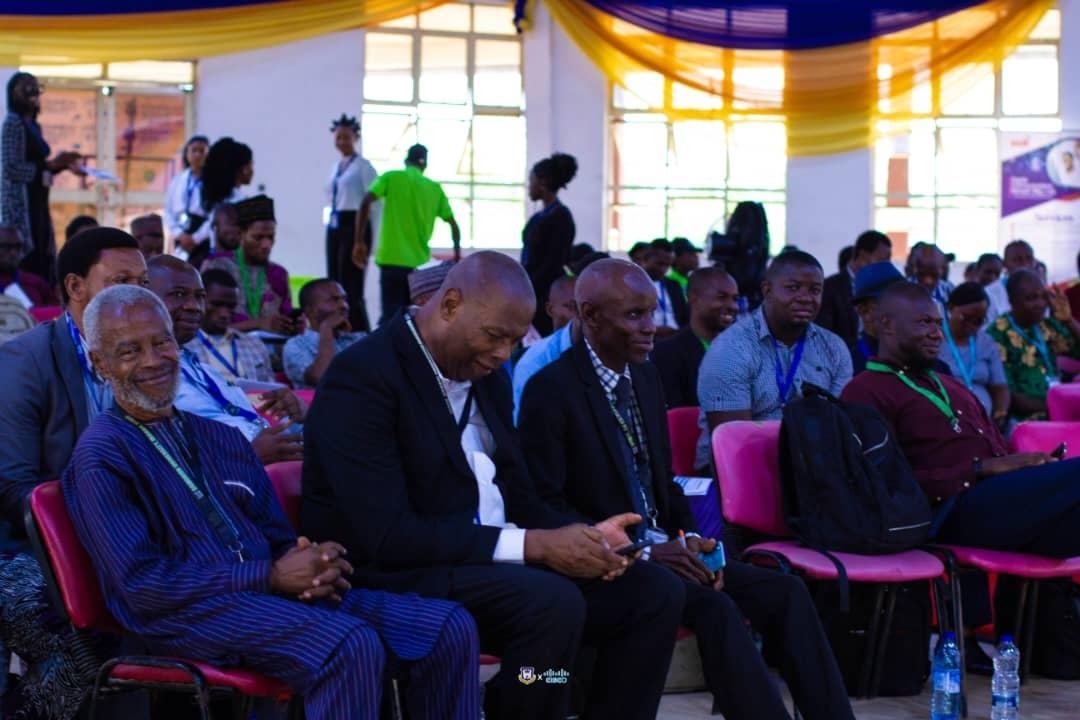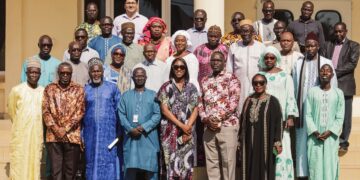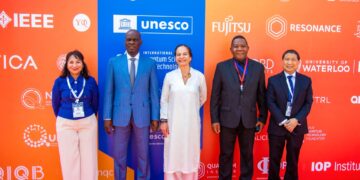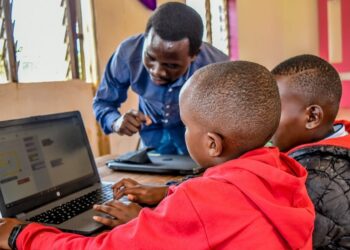
Technology has been identified as the modern day tool that will help to end hunger and poverty in our modern world, especially in West and Central Africa.
This was expressed by speakers at the 2024 English West and Central Africa Instructors’ Event, organised by Commercial and Industrial Security Corporation (CISCO) Networking Academy in partnership with Dominion University, Ibadan. This year’s event, which was held at Dominion University, commemorates the 25th anniversary of the digital academy in providing industry- specific solutions that improve productivity and operational efficiency. The technologically inclined networking academy is also in the business of laying foundations for tomorrow’s Internet of Things (IoT) opportunities. This year’s theme is tagged, ‘The Future of Work.’
At this year’s event, the Cisco Networking Academy General Manager, Laura Quintana welcomed instructors from both the West and Central African English speaking countries and in her speech, Quintana identified some of the African and Southern American students who had benefited from the networking academy. They were able to stamp out poverty and hunger from their families because of this Cisco initiative. She also noted that since the launch of the networking academy 25 years ago, over 20.5 million learners have benefitted from it. The Academy has also trained over 29,000 instructors who cut across 190 countries.
On his part, the Programme Manager of Cisco Networking Academy, Mr. Imoh Akpan noted that Safari conference is an annual event that is organised for English speaking instructors in West and Central Africa. The aim of Safari, according to him, is to raise and maintain the quality of instruction by offering quality technical restraining sessions to instructors, to provide programme updates on the new curriculum, which includes technical updates on tech trends, education trends and courseware. Mr Akpan informed participants that the 2024 event will avail them the opportunity to acquire knowledge and develop skills through keynotes addresses to be delivered by technology experts. He also said they would break the conference into sessions that will ‘bring enhanced value to their academics’.

The Vice Chancellor of Dominion University, a faith based institution, Professor Abel Olajide Olorunnisola, in his welcome address as the host, revealed how technological advancement has caused a shift in jobs globally. He went on to classify work into three stages; The Agricultural age which was characterized by ownership of land. The Industrial age which centred on ownership of capital and thirdly, the Knowledge age which has to do with ownership of knowledge and the ability to use it to provide goods and services. In his speech, Professor Olorunnisola said that it is projected that in the Knowledge Age, 2% of workers will work on the land, 10% will work in industry, while the rest shall be knowledge workers. He said that from 1980 to 2016 (the latest recorded data) 1.9m knowledge workers have been added to the workforce every year. According to him, ‘The future of work is expected to be characterized by constant change and organisations must adapt if they are to thrive.’ He advised organisations to embrace technology and to be innovative in order to stay ahead. Professor Olorunnisola also noted how the outbreak of Covid-19 further brought advancement in technology to the world workforce.
While stating the vision of the institution, Professor Olorunnisola announced that Dominion University is working assiduously to ensure it produces graduates ‘with employable skills.’ In the same vein, the Director General of the National Information Technology Development Agency (NITDA), Kashifu Inuwa Abdullahi, in his address at the event noted that his agency is in partnership with Cisco Networking Academy to provide digital literacy and skills development as a means to fighting poverty and hunger in the country.
In his address titled, ‘ The Future of Work’, the Director General NITDA, who was represented by the agency’s Director of Digital Literacy, Dr. Ahmed Yusuf Tambuwal noted that, ‘digital literacy and skill development is gaining reputation as the most valuable tool for learning and to fight against poverty and hunger.’ Continuing, he pointed out that the world has changed over the last couple of decades to become a global village. The DG noted that Artificial intelligence, block chain, data science, 5G network among others have become digital skills for the digital future. Furthermore, the DG identified the focus of the conference which is to update the knowledge of participants and to provide an opportunity for them to network, so they can share ideas. He added that digital literacy is the first pillar of NITDA and that it goes in line with the Renewed Hope programme of the Ahmed Bola Tinubu administration.

The DG of NITDA further noted that the agency has been able to train thousands of Nigerian students, youth and civil servants in the area of Artificial intelligence, Graphics and UI design among others. He noted that the 3MTT programme of the agency is targeting the future of work in Nigeria. He said the agency will continue to partner with Cisco Networking Academy to provide digital training to the Nigerian youth as they constitute 74% of the Nigerian population. The Executive Secretary, National Board for Technical Education (NBTE), Professor Idris Bugaje, while declaring the conference open, listed the focus of the conference to include: raising and maintaining the quality of instruction by offering quality technical restraining sessions to instructors, providing guidelines to academics in effectively managing the business of their academics and workforce development. Others include: providing programme updates for new curriculum, which include technical updates on tech trends, education trends, and to facilitate networking between academics and prospective employers, as well as sharing content and resources to instructors and learners for use in the classrooms. In his speech titled, ‘Enabling Educators and learners to thrive in the digital world’, the DG, represented by the Acting Director, NBTE South West Zonal office, Mr Ayodele Aroge, spoke on factors that would enable educators and learners to thrive in the digital world. While delivering his keynote address, Mr. Aroge defined the meaning of educators, learners, the digital world and the key terms in the topic. He defined an educator as someone who instructs or teaches others, usually in a school, university or other educational institutions. Such educators could be teachers, professors, trainers, coaches or anyone else who helps learners acquire knowledge, skills and values, while a learner is someone who is engaged in the process of acquiring new knowledge, typically in an educational setting. Profesor Bugaje defined the digital world as the digital space or technological platform that facilitates learning.
According to him, ‘Digital world can be said to be in the digital space. It is a technical platform and tool that facilitates communication, interaction, learning and other activities in the modern world.’

Mr. Aroge then noted that for an educator to thrive in the digital world, he or she must embrace technology, be current, and should collaborate with other educators and professionals from around the world in order to share ideas, resources, and best practices. Also, educators must adapt to the needs of learners, use social media, seek professional development and take advantage of online learning opportunities. On the part of the learners, Mr. Aroge added that learners must practice lifelong learning, network with professionals and utilize digital portfolios.
Mr. Aroge used the event to sensitize participants on the task of NBTE, which includes taking responsibility to maintain and to set standards in technical education and training institutions that award diplomas and higher diplomas. The body also manages technical colleges and technical institutions that offer technical skills in both formal and informal settings.
Mr. Aroge reeled out the focus of NBTE to include: raising and maintaining technical training sessions to institutions, focusing on providing guidelines to academics and effectively managing the business of the academics’ workforce and its environment. Others include: providing programme updates for the new curriculum, providing technical updates on technical trends and facilitating networking between academics and prospective employers for workforce development programmes. The South West zonal head of NBTE, at the event, announced that NBTE has established digital accreditation to polytechnics in Nigeria. This, he noted, will enable the body to accredit institutions without physical visitation. In his words, ‘the objective of digital accreditation is for the body to conduct accreditation in polytechnics without visiting the institution.’
The conference played host to academics and instructors from several institutions – the host, Dominion University and then the University of Jos, the University of Port Harcourt, South West Resource Centre, Unite Academy (Ghana) and several other institutions from the English speaking West and Central Africa countries.
______________________
Lanre Fehintola, a freelance Journalist based in Ibadan covered this event on behalf of EduTimes Africa.


















































































 EduTimes Africa, a product of Education Times Africa, is a magazine publication that aims to lend its support to close the yawning gap in Africa's educational development.
EduTimes Africa, a product of Education Times Africa, is a magazine publication that aims to lend its support to close the yawning gap in Africa's educational development.